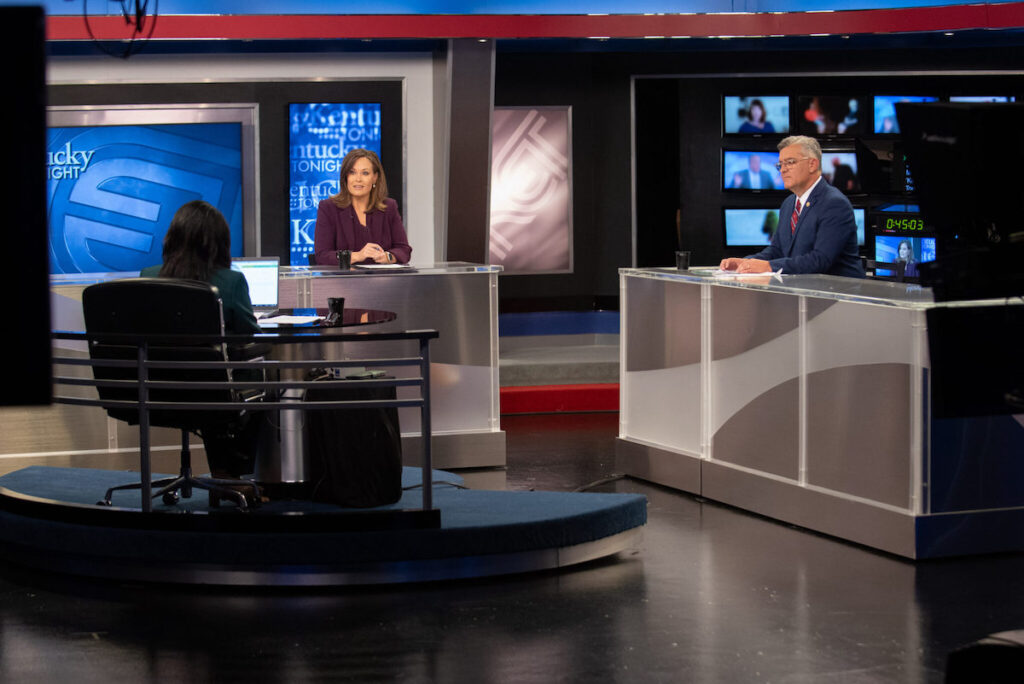LEXINGTON, Ky. — Democratic Lt. Gov. Jacqueline Coleman and Republican state Sen. Robby Mills, who are the running mates of Kentucky’s gubernatorial candidates, faced each other Monday night in a debate on KET.
The debate is the only joint appearance between Coleman and Mills in which they can speak for their tickets ahead of the Nov. 7 election.
Democratic Gov. Andy Beshear and Republican gubernatorial candidate and Attorney General Daniel Cameron recently finished five back-to-back debates across the state and were on the campaign trail most of Monday.
Throughout the debate, Coleman, who was elected to her position with Beshear in 2019, repeated much of what the governor has said while running for reelection, and highlighted the administration’s support for public education and accomplishments in economic development.

On the other side, Mills, who is from Henderson in Western Kentucky, reflected Cameron’s plans, such as working closely with the state legislature to enact conservative policies and catching students up from learning loss experienced during the coronavirus pandemic.
Coleman and Mills discussed education, energy, public safety and more on Monday.
KET’s Renee Shaw opened the debate by asking both candidates if they felt prepared to assume the role of governor, or if they wanted to seek it on their own in the future. Both candidates said their focus is on the upcoming election and the next four years.
“Sitting beside the governor, making those tough decisions, talking budget, figuring out how we can show up for Kentuckians every single day has been an honor, and it’s been certainly a learning process, as any new role is,” Coleman said.
Mills, who said Cameron called him to join the campaign more than 14 weeks ago, said he had previously been focused on continuing his role in the legislature.
“I have quite a bit of legislative experience and local government experience,” Mills said. “I’m a small business owner. I believe I know how to answer the call when the call is made, and feel like I’m prepared to serve as lieutenant governor and would be prepared to be governor as well.”
Neither Coleman nor Mills addressed reporters after the debate.
Education
As some predicted, Coleman and Mills spent much of the debate discussing Kentucky’s education system. Since Mills joined Cameron this summer, the Beshear campaign has criticized Mills’ support of a 2018 “sewer bill” overhauling teacher pensions. In a surprise move, lawmakers inserted the pension changes into a bill that had originally been about “wastewater services.” The legislation, backed by former Republican Gov. Matt Bevin, was eventually struck down by the state Supreme Court
When the bill came up Monday night, Mills said at the time the bill was being considered, pensions were in terrible shape and that after the law was ruled unconstitutional the General Assembly solved the issues through other legislation.
When Bevin and Beshear faced each other in the 2019 general election, Beshear’s opposition to the sewer bill as attorney general helped him win support from public educators.
“Ultimately, teachers’ pensions are being taken care of and being funded. And no current teachers had benefits in their contract changed,” Mills said during the debate. “The changes were made to new teachers coming in.”
Coleman, who has been a public school teacher and administrator, pushed back at Mills’ support of the bill.
“As bad as the sewer bill was, the dishonest way that they tried to sneak it in the law was probably worse,” she said.
Coleman, in her responses about education, also reiterated a Beshear administration priority — funding universal pre-kindergarten programs for all Kentucky students.
Mills said a Cameron-Mills administration would be open to exploring universal pre-K before saying K-12 schools should be funded adequately.
“It is being funded (public education), but we can always do better in K-12 education,” Mills said before explaining Cameron’s “Catch-up” plan as one-time expenditures to help students make up for pandemic learning loss.
Coleman and Mills also discussed school voucher programs, which would allow public funding to follow students to private schools. The conversation mirrored much of what Beshear and Cameron said in their recent debates on the subject.
Mills said the Beshear-Coleman focus on school vouchers was a “red herring” and that he and Cameron have been talking about only public schools in their campaign and education platform. Mills, however, did say he believed it is “important to offer our kids the best choice,” but stopped short of saying he would support putting a constitutional amendment on the ballot to allow public dollars to be spent to support private education.
Coleman, as Beshear has, said she opposed voucher programs.
Energy and environment
Another portion of the debate focused heavily on energy and the environment. Shaw asked Mills if he believed in climate change and if fossil fuels are a contributing factor. While Mills didn’t answer the question at first, he later said that climate change is “not as big as what it appears to be.”
Coleman said climate change is real and also pointed to new businesses opening in Kentucky with a focus on clean energy, such as electric vehicle battery plants, as a sign that Kentucky has a bright future. When asked what a Beshear-Coleman administration would do to address health concerns for coal miners who contract black lung disease, Coleman pointed to expanding health care.
“We believe health care is a basic human right, and at every opportunity we have work to expand access, to improve quality and make sure that Kentuckians, when they’re sick, can see a doctor,” Coleman said.
Mills emphasized that he worried that the state would not have enough power if electric utilities move away from burning fossil fuels. He also said that coal miners with long-term injuries deserve worker’s compensation.
“I do not think we’re going to have enough power to power homes, and we’re going to see blackouts and brownouts moving forward,” Mills said.
Public safety
Mirroring the heads of their tickets, Coleman and Mills discussed what their administrations’ approaches to public safety would look like over the next four years.
Mills criticized Beshear for commuting the sentences of 1,870 inmates early on during the pandemic. Cameron has also made similar comments about the commutations.
The inmates who were medically vulnerable or near the end of their sentences and who had not been convicted of violent or sexual offenses were released early in the coronavirus pandemic to relieve crowding that spurred transmission of the virus. The Cameron campaign released data showing “nearly 70 percent of the prisoners released by Beshear have recommitted offenses.”
However, Kentucky Justice & Public Safety Cabinet said as of August 2023, “fewer than 10% have been convicted of a felony prior to their original projected release, which is lower than the current statewide recidivism rate.” Additionally, as of early October, two people who received a commutation had been convicted of a “violent crime” as defined by state law before their original release date, or 0.1% of those commuted.
“Daniel Cameron and I are not going to let people out of jail. We don’t give out get-out-of-jail free cards,” Mills said.
In defense, Coleman said the commutations came at the start of the coronavirus pandemic and that the people released were “days away” from finishing their sentences. Additionally, she said the move was done to keep corrections workers safe.
“They deserve to be able to go home to their families and not worry that they’re going to take home a deadly virus to them,” she said.
This article is republished under a Creative Commons license from Kentucky Lantern, which is part of States Newsroom, a network of news bureaus supported by grants and a coalition of donors as a 501c(3) public charity. Kentucky Lantern maintains editorial independence. Contact Editor Jamie Lucke for questions: info@kentuckylantern.com. Follow Kentucky Lantern on Facebook and Twitter.






